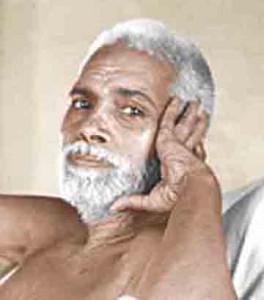Reality In Forty Verses (Part Two)

Reality In Forty Verses (Part Two)
By Ramana Maharshi,
excerpts from The Collected Works of Ramana Maharshi, edited by Arthur Osborne. There is an excellent website for Ramana Ashram that includes many photos and all of Sri Ramana’s works. Visit them online at www.ramanamaharshi.org
22. How is it possible for the mind to know the Lord, who imparts His light to the mind and shines within the mind, except by turning the mind inward and fixing it in the Lord?
23. This body does not say ‘I’. Nobody says “I did not exist during sleep’. Once the ‘I’ arises everything arises. Enquire with a keen mind whence this ‘I’ arises.
24. The inert body does not say ‘I’. Being-Consciousness does not rise (and set). Between them and limited to the measure of the body something emerges as ‘I’. It is this that is known as the knot (granthi) between the consciousness and the inert and also as bondage, individual being, subtle body, ego, the samsara, mind. This know.
25. Attaching itself to a form (that is, the body) this formless ghost of an ego comes into existence. Attaching itself to a form it endures. Attaching itself to a form it feeds (experiences) and grows. On relinquishing one form it attaches itself to another. But when sought after it takes to flight. This know.
26. If the ego is, everything else is too. If the ego is not, nothing else is. Indeed the ego is everything. Therefore the enquiry what it is really means giving up everything. This know.
27. The state in which the ‘I’ does not arise is the state of being ‘That’. Without seeking the place from which the ‘I’ arises, how is one to bring about the extinction of oneself characterized by the non-arising of the ‘I’? And without effecting that extinction how is one to abide in one’s true State in which one is That? Answer me.
28. Just as one would dive into water to see (recover) an article (which had fallen in) one should dive deep into oneself with speech and breath restrained, and find out the place from which the ‘I’ arises. This know.
29. Seeking the source of the ‘I’ inwardly, with the inturned mind, without uttering the word ‘I’ is the true path of Knowledge. Meditation on ‘‘I’ am not this’, ‘I am that’ may be auxiliary but cannot be the enquiry.
30. When the mind, turning inward, inquires, ‘Who am I?’ and reaches the heart, that which is ‘I’ (ego) sinks crestfallen and the One (Self) appears of its own accord as ‘I-I’. Though it appears thus it is not the ego; it is the Whole. It is the real self.
31. To one who has destroyed himself (his ego) and is awake to his nature as bliss, what remains to be accomplished? He does not see anything (as being) other than himself. Who can comprehend his state?
32. Although the scriptures proclaim ‘That thou art’ it is a sign of weakness to meditate: ‘I am not this but That’ instead of enquiring what one is and remaining so; for one is always That.
33. It is absurd to say either: ‘I have not realized the Self’ or ‘I have realized the Self’. Why? Are there two selves for one to be the object of the other? It is the experience of all that it (the Self) is one.
34. It is due to the illusion born of ignorance that, instead of realizing that which is always the nature of every one and which shines in the heart and abiding as that, men dispute whether it is or is not, has form or not, is single or dual or neither.
35. To realize the Self which is always present and to remain as that is (the real) attainment. All other attainments are like those which appear in a dream. Are these real when one awakes? Will those who have got rid of delusion and are established in their true state be deluded again?
36. If we think, ‘I am the body’, the thought, ‘no, I am That’ will help us to abide as That; but should we keep on thinking that? Does (a man) keep on thinking he is a man? We are just That.
37. The precept; ‘duality while seeking and non-duality on attainment’ is not right. Who else is but the tenth man,1 both while anxiously searching for one’s Self and after attaining one’s Self? (1. This refers to a traditional story of a party of ten fools who were traveling together. They had to cross a river and on reaching the other shore wanted to check up whether all of them had got safely across. Each one counted in turn, but each one counted the nine others and forgot himself. So they thought the tenth man had been drowned and began to mourn him. Just then a traveler came past and asked them what was the matter. He at once saw the cause of their mistake and in order to convince them he made them walk past him one by one, giving each a blow as he passed and telling them to count the strokes.
38. As long as we are the performers of actions we have to undergo their consequences but when, as a result of enquiring who is the performer, one knows one-self, the sense of being the performer is lost and one is set free from the three kinds of karma. The (resulting) state of Liberation is eternal.
39. It is only so long as the thought ‘I am bound’ continues that the thoughts of bondage and Liberation continue. When, through the enquiry ‘Who is bound?’ one sees (realizes) one’s Self, the ever-attained and eternally free Self alone remains. The thought of bondage does not remain, so how can the thought of Liberation?
40. It is said that Liberation is one of three kinds, with form, without form and with and without form, we say Liberation is the destruction of the ego which discusses whether it is with form, without form or with and without form.

